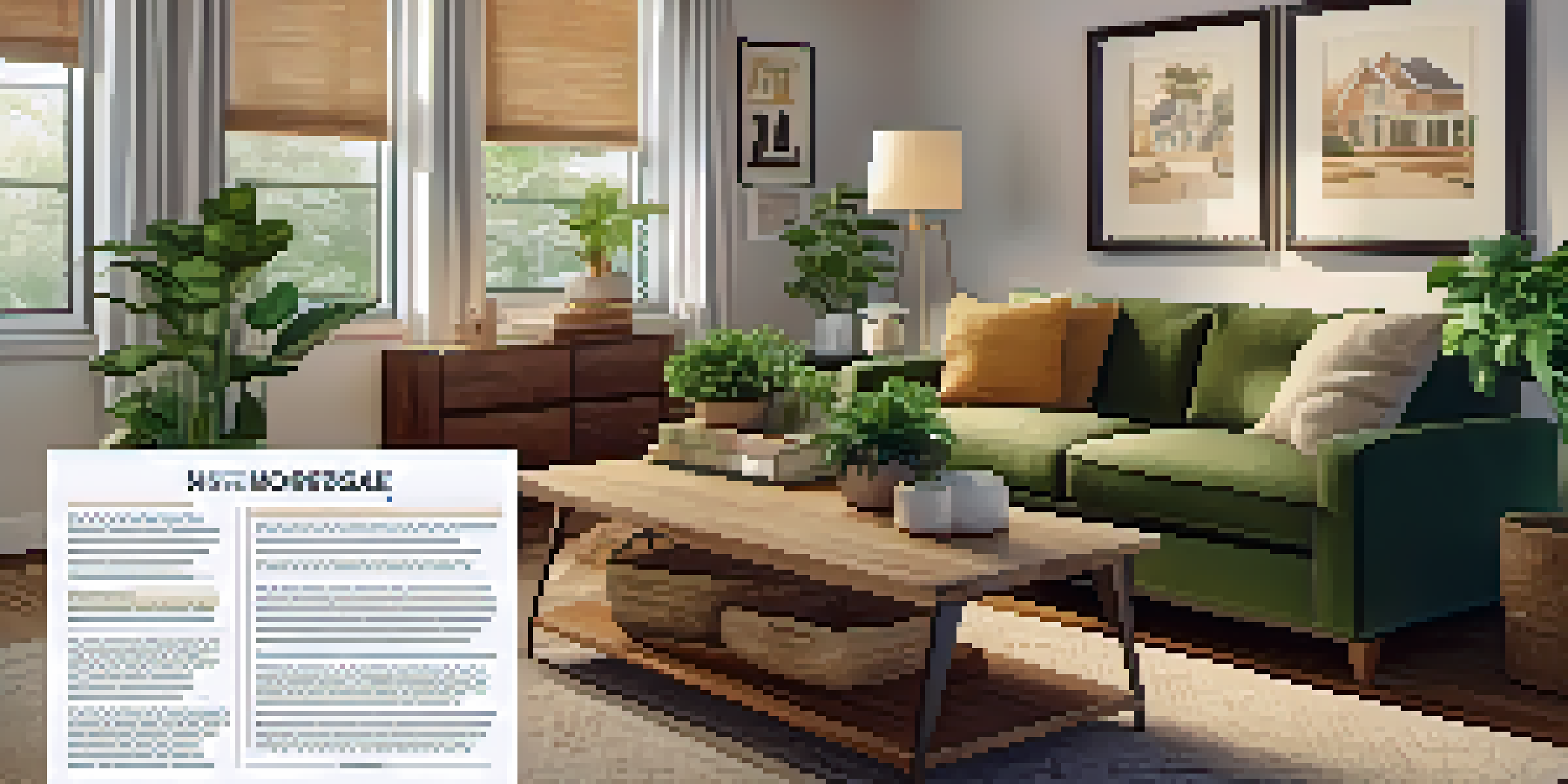The Benefits of Fixed-Rate vs Variable-Rate Mortgages

Understanding Fixed-Rate Mortgages and Their Stability
Fixed-rate mortgages are loans where the interest rate remains constant throughout the loan's term. This means your monthly payments are predictable, which makes budgeting easier. For homeowners, this stability can be a comforting factor, especially in a fluctuating economy.
In the midst of chaos, there is also opportunity.
The predictability of fixed-rate mortgages is particularly beneficial for long-term planning. If you secure a low interest rate, you can save a considerable amount over the life of the loan. This type of mortgage can feel like a safety net against rising interest rates.
However, while the stability is appealing, fixed-rate mortgages may come with higher initial rates compared to their variable-rate counterparts. This means that borrowers might miss out on lower rates during periods of economic downturns.
Exploring Variable-Rate Mortgages and Their Flexibility
Variable-rate mortgages, also known as adjustable-rate mortgages (ARMs), have interest rates that can change over time based on market conditions. This means your monthly payments can fluctuate, which may be appealing if rates decrease. It’s like riding a wave; sometimes you're soaring, and other times you might be caught off guard.

One significant advantage of variable-rate mortgages is that they often start with lower rates compared to fixed-rate loans. This can make homeownership more accessible for first-time buyers who are looking to save money upfront. However, this initial lower rate can be a double-edged sword if rates rise significantly later on.
Fixed-Rate Mortgages Offer Stability
They provide predictable monthly payments, making budgeting easier in uncertain economic times.
It's essential to understand the terms of your variable-rate mortgage thoroughly. Many loans come with caps that limit how much your rate can increase at each adjustment, which can provide a layer of security. Still, the unpredictability can be daunting for some borrowers.
Assessing Your Financial Situation Before Choosing
Before deciding between a fixed-rate or variable-rate mortgage, it’s crucial to assess your financial situation. Consider your income stability, how long you plan to stay in the home, and your risk tolerance. If you foresee moving in a few years, a variable-rate mortgage might be more financially advantageous.
The best time to plant a tree was twenty years ago. The second best time is now.
On the other hand, if you're looking for long-term stability and plan to stay put, a fixed-rate mortgage could be the better option. This provides peace of mind knowing your payments won’t change. Think of it as choosing between a reliable sedan and a sports car; one is stable while the other offers excitement.
Evaluating your personal circumstances will help you make an informed decision. It’s also wise to consult with a financial advisor or mortgage professional to weigh your options against current market conditions.
The Impact of Interest Rate Trends on Your Decision
Interest rate trends can play a significant role in your mortgage decision. If rates are low and you opt for a fixed-rate mortgage, you can lock in those savings. Conversely, if rates are high, a variable-rate mortgage might seem risky, but it could be advantageous if rates drop in the future.
Keeping an eye on economic indicators can be beneficial. For instance, if inflation is on the rise, central banks may increase rates, impacting your variable-rate mortgage. Understanding these trends is similar to watching the weather before a big trip; it prepares you for what lies ahead.
Variable-Rate Mortgages Can Save Money
These loans often start with lower rates, which can lead to significant savings if rates remain stable or decline.
Ultimately, staying informed about interest rate movements can help you decide which mortgage type aligns with your financial strategy. It’s about finding the right moment to make your move in the market.
Benefits of Fixed-Rate Mortgages in Economic Uncertainty
In times of economic uncertainty, fixed-rate mortgages provide a sense of stability and predictability. Homeowners are shielded from sudden increases in interest rates, allowing them to plan their finances without the stress of fluctuating payments. It's like having an umbrella on a rainy day; you’re prepared for whatever comes your way.
This fixed nature allows homeowners to build equity more confidently, knowing exactly what their payments will be. The long-term commitment can also provide a sense of security that many appreciate, especially in turbulent economic times.
While fixed rates may not always be the lowest option, the peace of mind they offer can outweigh the potential savings of a variable-rate mortgage during uncertain times.
Advantages of Variable-Rate Mortgages in a Growing Market
In a growing market where interest rates are stable or declining, variable-rate mortgages can be incredibly advantageous. Borrowers can benefit from lower initial rates, which can translate to significant savings, especially in the early years of the loan. It’s like catching a great sale on your favorite product; you feel like you’ve gotten a fantastic deal.
Moreover, if the economy is strong and rates remain low, borrowers can enjoy reduced monthly payments compared to fixed-rate mortgages. This can free up funds for other investments or personal expenses, providing financial flexibility.
Assess Your Financial Situation First
Understanding your income stability and long-term plans is crucial in choosing the right mortgage type.
However, it’s essential to remain cautious and have a plan in place for potential rate increases. Knowing your options and setting a budget can help mitigate risks while enjoying the benefits of a variable-rate mortgage.
Making the Best Choice for Your Homeownership Journey
Ultimately, choosing between a fixed-rate and a variable-rate mortgage depends on your individual circumstances and long-term goals. Both options have their merits, and understanding those can help you make the best decision. It’s like choosing a path in a forest; each route has its unique scenery and challenges.
Consider factors such as your financial stability, how long you plan to stay in your home, and your comfort level with risk. It’s essential to weigh the pros and cons carefully to find the right fit for your lifestyle.

Regardless of the choice you make, being informed and proactive in your decision-making will empower you on your homeownership journey. Take the time to explore your options and consult with financial professionals to ensure a smooth path ahead.